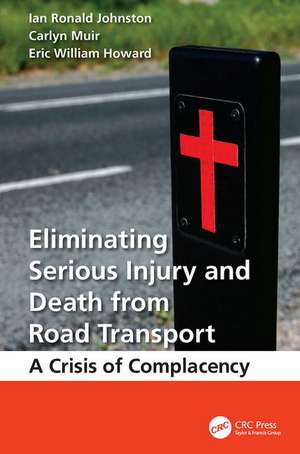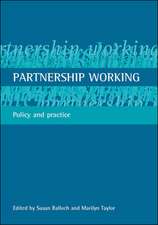Eliminating Serious Injury and Death from Road Transport: A Crisis of Complacency
Autor Ian Ronald Johnston, Carlyn Muir, Eric William Howarden Limba Engleză Paperback – 29 mar 2017
Should we really accept road trauma as collateral damage from daily road use? Eliminating Serious Injury and Death from Road Transport: A Crisis of Complacency explores why societies and their elected leaders view traffic safety as a (relatively) minor problem. It examines the changes in the culture of road use that need to occur if this public health problem is to be effectively resolved.
- Examines why road use culture is ego-centric ("what’s in it for me?") and why this blocks progress
- Explores current traffic safety measurement methods and demonstrates how they have underpinned our flawed approach
- Discusses the controversial issue of speed and speeding and shows how a new approach to speed management will be fundamental to transformational change
- Details a simple account of the concept of a "Safe System" (as now promoted by the WHO and the OECD) while exploring the failure to get beyond the principles to extensive implementation
| Toate formatele și edițiile | Preț | Express |
|---|---|---|
| Paperback (1) | 455.31 lei 6-8 săpt. | |
| CRC Press – 29 mar 2017 | 455.31 lei 6-8 săpt. | |
| Hardback (1) | 1109.36 lei 6-8 săpt. | |
| CRC Press – 11 dec 2013 | 1109.36 lei 6-8 săpt. |
Preț: 455.31 lei
Preț vechi: 535.66 lei
-15% Nou
Puncte Express: 683
Preț estimativ în valută:
87.12€ • 94.93$ • 73.41£
87.12€ • 94.93$ • 73.41£
Carte tipărită la comandă
Livrare economică 23 aprilie-07 mai
Preluare comenzi: 021 569.72.76
Specificații
ISBN-13: 9781138077133
ISBN-10: 1138077135
Pagini: 199
Ilustrații: 20 Tables, black and white; 24 Illustrations, black and white
Dimensiuni: 156 x 234 x 11 mm
Greutate: 0.29 kg
Ediția:1
Editura: CRC Press
Colecția CRC Press
ISBN-10: 1138077135
Pagini: 199
Ilustrații: 20 Tables, black and white; 24 Illustrations, black and white
Dimensiuni: 156 x 234 x 11 mm
Greutate: 0.29 kg
Ediția:1
Editura: CRC Press
Colecția CRC Press
Cuprins
A Zero Road Toll is Not a Pipe Dream. Serious Crashes Happen to Real People. The Way We View Safety Is a Big Part of the Problem. The Car in Society. A Brief History of How and Why Science Takes a Back Seat. The Evolution of Safe System Thinking. Serious Crashes Have Impacts Way Beyond Those Injured. Approaching Traffic Safety as Preventive Medicine. Speed Moderation – The Most Difficult Issue of All. Confronting Complacency. Putting Safe System into Practice Right Now. Six Vital Steps Towards Zero.
Notă biografică
Dr. Ian Ronald Johnston is a psychologist with a PhD in human factors. He has worked in the transport field, specialising in transport safety, for over 40 years. He worked in the Australian government’s inaugural road safety unit in the 1970s, headed the Victorian government’s road safety unit in the 1980s, was managing director of Australia’s premier transport research organisation in the 1990s, and was director of the world-renowned Monash University Accident Research Centre until his retirement (from full-time work) in 2006. Dr. Johnston now runs his own consultancy specialising in helping government and industry develop and implement safety strategies. He is also deputy chair of Australia’s National Transport Commission and a member of the Core Advisory Group of the World Bank’s Global Road Safety Facility. He was a member of Australia’s National Road Safety Council for the 3 years of its existence. Dr. Johnston has published extensively in the field and has received several awards for his work, ncluding being made a member of the Order of Australia in 1997.
Dr. Carlyn Muir is a research fellow at the Monash Injury Research Institute, which incorporates the Monash University Accident Research Centre (MUARC). She is a psychologist whose doctoral research examined driver licensing policy for people following brain injury. She has been involved in the development and review of public health policy not only from a research perspective, but also through direct policy implementation within state health services. Dr. Muir’s current research involves the design and implementation of a range of injury prevention and public health projects, with a focus on community health and safety, policy, and evaluation. She has published journal articles, book chapters, and government reports across the community safety space.
Since 2006 Eric William Howard has operated a strategic road safety consultancy that provides advisory services to clients including the World Bank, Global Road Safety Partnership, AusAID, PIARC, OECD/ITF, international NGOs, and overseas and Australian national and state governments and corporations. Howard was general manager of road safety for VicRoads, the lead role in the Victorian government, for 7 years. He was also a member of the Ministerial Road Safety Council and the National Road Safety Task Force following a career as a local government CEO and senior engineering manager for 24 years. His experience in public health includes 4 years as a board vice president of Mercy Hospital for Women, a leading teaching hospital in Melbourne. Howard chaired the OECD/ITF working group, which developed the “Towards Zero: Ambitious Targets and Safe System Approach” report, published in 2008; he was principal author for the United Nations Road Safety Collaboration–sponsored Speed Management Manual published in March 2008; and he was the independent chair of the Western Australian Parliamentarians’ Road Safety Reference Group from 2008 to 2011. He chairs a number of road safety task forces for the New South Wales government and he is co-chair of the 33,900—the Australian Road Safety Collaboration.
Dr. Carlyn Muir is a research fellow at the Monash Injury Research Institute, which incorporates the Monash University Accident Research Centre (MUARC). She is a psychologist whose doctoral research examined driver licensing policy for people following brain injury. She has been involved in the development and review of public health policy not only from a research perspective, but also through direct policy implementation within state health services. Dr. Muir’s current research involves the design and implementation of a range of injury prevention and public health projects, with a focus on community health and safety, policy, and evaluation. She has published journal articles, book chapters, and government reports across the community safety space.
Since 2006 Eric William Howard has operated a strategic road safety consultancy that provides advisory services to clients including the World Bank, Global Road Safety Partnership, AusAID, PIARC, OECD/ITF, international NGOs, and overseas and Australian national and state governments and corporations. Howard was general manager of road safety for VicRoads, the lead role in the Victorian government, for 7 years. He was also a member of the Ministerial Road Safety Council and the National Road Safety Task Force following a career as a local government CEO and senior engineering manager for 24 years. His experience in public health includes 4 years as a board vice president of Mercy Hospital for Women, a leading teaching hospital in Melbourne. Howard chaired the OECD/ITF working group, which developed the “Towards Zero: Ambitious Targets and Safe System Approach” report, published in 2008; he was principal author for the United Nations Road Safety Collaboration–sponsored Speed Management Manual published in March 2008; and he was the independent chair of the Western Australian Parliamentarians’ Road Safety Reference Group from 2008 to 2011. He chairs a number of road safety task forces for the New South Wales government and he is co-chair of the 33,900—the Australian Road Safety Collaboration.
Recenzii
"In this passionate, punchy and persuasive new book, the authors explore our love of the car, our dependence on it, and the risks we tolerate in return for the benefits it brings. … Overall, very readable, thought provoking and strongly recommended."
—Health and Safety at Work, June 2014
"This new book explores why societies and their elected leaders view road safety as a relatively (minor) problem. It examines the changes in the culture of road use that need to occur if this public health problem is to be effectively resolved. … a must read …"
—Lauchlan McIntosh AM FACRS, President, Australasian College of Road Safety in Journal of the Astralasian College of Road Safety, 2014
—Health and Safety at Work, June 2014
"This new book explores why societies and their elected leaders view road safety as a relatively (minor) problem. It examines the changes in the culture of road use that need to occur if this public health problem is to be effectively resolved. … a must read …"
—Lauchlan McIntosh AM FACRS, President, Australasian College of Road Safety in Journal of the Astralasian College of Road Safety, 2014
Descriere
The book explodes the myths that currently drive society’s view of traffic safety and limit progress in reducing death and serious injury. It presents current scientific knowledge in a non-technical way and draws parallels with other areas of public safety and public health. It uses examples from the media and from public policy debates to paint a clear picture of a flawed public policy approach and offers preventive medicine principles to take the field forward.













